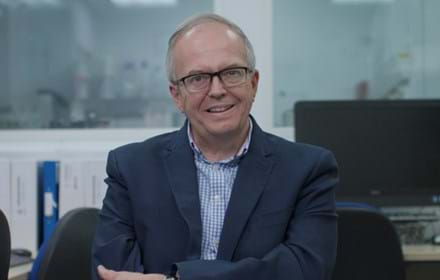
Study opens to screen young people for type 1 diabetes
Launched to coincide with World Diabetes Day (14th November), the study is looking to recruit 20,000 young people for type 1 diabetes screening programme.
A new trial screening programme for type 1 diabetes has been launched to coincide with World Diabetes Day (14th November).
The ELSA study is the first research of its kind in the UK will identify children at high risk of type 1 diabetes, laying the groundwork for the development of a potential UK-wide screening programme.
It is hoped the programme could transform the way the condition is identified and managed in its earliest stages.
The ELSA study (EarLy Surveillance for Autoimmune diabetes) will recruit 20,000 children aged between three and 13 to assess their risk of developing type 1 diabetes.
Type 1 diabetes is caused by an immune system attack on insulin-producing cells in the pancreas. It is possible to spot the very earliest signs that the immune system is planning an attack and find people who have a high risk of developing type 1 diabetes in the future.
The ELSA study will screen children for these signs, called autoantibodies, using blood tests. Autoantibodies are tools used by the immune system to mark insulin-producing cells for destruction. They can appear in the blood years, or sometimes decades, before people begin to experience any symptoms and receive a type 1 diagnosis.

Your risk of type 1 diabetes increases with the number of different autoantibodies found in the blood. People with two or more autoantibodies have an 85% chance of developing type 1 diabetes within 15 years, and it’s almost certain that they will develop the condition in their lifetime.
The ELSA study team will offer children found to be at risk and their families support and education, including information on symptoms, insulin injections and carb counting. This will help prepare them for a future diagnosis of type 1 diabetes. Families can also be followed up and monitored in the long term, and potentially start insulin treatment sooner.
The study is run by NHS and funded by Diabetes UK and JDRF. Find out how your child can take part in the ELSA study here
Professor Parth Narendran and Dr Lauren Quinn, who lead the ELSA study at the University of Birmingham, said: “As general population screening programmes for type 1 diabetes emerge around the world, we need to explore how best to screen children here in the UK. The ELSA study will ask important questions about the best ways to recruit and explore the experiences of families who take part.
“Screening children can reduce their risk of DKA at diagnosis by about five times and can help them and their families settle into the type 1 diagnosis better. We know the value of identifying people at risk of type 1 diabetes and we have the tools to do so – now we need to understand how best to implement them in the UK.
“We are extremely grateful to our funders, Diabetes UK and JDRF. We hope ELSA will lead to the roll-out of a type 1 diabetes early detection programme for children in the UK and encourage families with children at a suitable age to consider taking part. To find out more about the ELSA study and to sign up.”

Researchers said it is essential type 1 diabetes is diagnosed quickly to avoid life-threatening complications. However, over a quarter of children aren’t diagnosed with type 1 diabetes until they are in diabetic ketoacidosis (DKA), a condition that requires urgent hospital treatment when the body starts breaking down fat too quickly.
Research in Europe and the USA has found that the extra support and monitoring type 1 diabetes screening programmes can offer dramatically reduces the risk of being diagnosed in DKA.
While the only treatment we currently have for type 1 diabetes is insulin, there are new immunotherapy treatments being tested that could prevent or delay the condition. Children found to be at high risk as part of the ELSA study could be invited to take part in research testing these treatments.
One immunotherapy drug, called teplizumab, has been found to delay a diagnosis of type 1 diabetes by up to three years. It is currently being reviewed for use in the UK.
The ELSA study team will interview families and healthcare professionals who take part in the study to understand their views on screening and the most effective way to deliver a future screening programme. These insights will be important in making the case for widespread routine screening for type 1 diabetes in the UK.
Case study
Jayne and Mike Fairclough from St Helen’s have two daughters, Libby, aged 6, and Lottie, aged 2. Libby was diagnosed with type 1 diabetes in 2019. Jayne said: “When Libby was diagnosed with type 1 diabetes, our world was turned upside down. Looking back all the signs were there, but we knew nothing about diabetes and never thought it would be that.
“We weren’t prepared for what was to come – diabetes took over our lives. Libby would cry with every blood test, every injection – it was really tough for all of us. When she was first diagnosed, I thought I’d never get my little girl back, but together we’ve learned how to manage her diabetes and it’s just part of our lives. Now Libby has a pump and she’s thriving. There’s nothing she can’t do.
“If we had known Libby was at risk of type 1 diabetes, we might have spotted the signs sooner and been able to prepare ourselves for her diagnosis. Screening for type 1 diabetes could help families avoid the shock diagnosis that we went through. If our youngest daughter, Lottie is also at risk, we’d want to know. The ELSA study gives us so much hope for a better future for children who are at risk of type 1 diabetes.”
World Diabetes Day was created in 1991 by International Diabetes Federation and the World Health Organization in response to growing concerns about the escalating health threat posed by diabetes. It is marked every year on 14th November, the birthday of Sir Frederick Banting, who co-discovered insulin along with Charles Best in 1922.
Watch the DRWF ‘Our Heroes’ video created for World Diabetes Day here
Read 100 years of insulin
Find out more about type 1 diabetes
Support DRWF by making a donation here
Find out more about DRWF-funded research here
Find out more about DRWF fundraising here
For latest update follow DRWF on Facebook, Instagram and Twitter
To receive the charity’s latest bulletins as they become available, please sign up here
Read DRWF diabetes information leaflets here
Join the Diabetes Wellness Network here
I would like to make a regular donation of
I would like to make a single donation of
There are lots of ways to raise money to support
people living with all forms of diabetes.
Bake, Swim, Cycle, Fly ... Do It For DRWF!
Fundraise with us
Recent News


